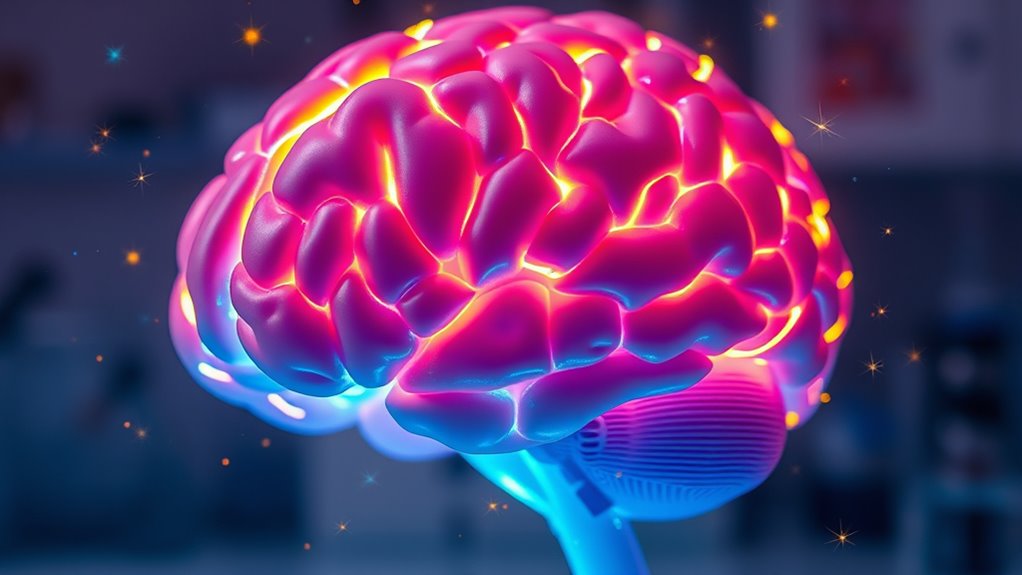The science of gratitude shows that practicing thankfulness boosts your happiness, strengthens social bonds, and rewires your brain for positivity. It activates neural pathways that enhance mood, release feel-good chemicals like serotonin and dopamine, and reduce stress. Regular gratitude exercises improve resilience, emotional stability, and mental health over time. If you keep exploring, you’ll discover practical ways to incorporate gratitude into your daily life and access its full benefits for lasting well-being.
Key Takeaways
- Practicing gratitude activates brain regions associated with positive emotions, reinforcing neural pathways that boost happiness and emotional resilience.
- Gratitude enhances social bonds, trust, and community cohesion, contributing to improved mental health and overall well-being.
- Regular gratitude exercises increase neurotransmitters like serotonin and dopamine, promoting mood stability and reducing stress.
- Scientific studies link gratitude to decreased depression and anxiety, fostering optimism and greater life satisfaction.
- Technological tools such as apps and virtual reality are expanding accessibility to gratitude practices, supporting long-term happiness development.
The Psychological Benefits of Practicing Gratitude

Practicing gratitude can profoundly boost your psychological well-being by shifting your focus from what’s lacking to what you appreciate. Techniques like gratitude meditation help you center on positive aspects of your life, fostering a sense of contentment. Regular gratitude journaling encourages you to reflect on daily blessings, which can reduce stress and increase happiness. These practices strengthen your emotional resilience by training your mind to notice and savor good moments. Over time, they promote a more optimistic outlook, making it easier to handle setbacks. By intentionally cultivating gratitude through meditation or journaling, you create a mental environment that supports happiness, reduces negative emotions, and enhances your overall psychological health. Recognizing the importance of emotional support can also play a vital role in sustaining your well-being.
How Gratitude Shapes Brain Function

When you practice gratitude, you activate specific neural pathways in your brain that reinforce positive thinking. This not only helps regulate your mood but also reduces stress over time. As a result, your brain becomes better at handling challenges and maintaining overall well-being. Incorporating gratitude practices can also lead to long-term changes in brain structure, similar to other brain plasticity processes that enhance mental resilience.
Neural Pathway Activation
Gratitude activates specific neural pathways in your brain, strengthening connections that promote positive emotions and well-being. When you practice gratitude, neural activation occurs in areas like the prefrontal cortex and the ventral striatum, reinforcing pathways associated with reward and social bonding. This pathway engagement boosts your brain’s response to positive experiences, making feelings of gratitude more automatic over time. As these pathways become more engaged, you’re more likely to notice and savor moments of kindness, fostering a cycle of positivity. Consistent gratitude practice fundamentally rewires your brain, enhancing neural efficiency for positive thoughts. This neural pathway activation not only amplifies happiness but also helps build resilience, making you more capable of handling stress and setbacks with a grateful outlook. Additionally, understanding the neuroplasticity of your brain illustrates how these changes are both significant and sustainable over time.
Mood Regulation Effects
By fostering positive emotions, gratitude actively influences how your brain regulates mood. When you practice gratitude regularly, it enhances your ability for emotion regulation, helping you respond calmly to stress and setbacks. This practice promotes mood stabilization by shifting focus from negative to positive thoughts, which strengthens neural pathways associated with resilience and emotional balance. Gratitude activates areas in your brain linked to reward and social bonding, making it easier to maintain a stable mood over time. As a result, you become more adept at managing fluctuations in your emotional state, reducing vulnerability to mood swings. This improved emotion regulation not only boosts your overall happiness but also creates a foundation for healthier mental habits and better resilience in daily life. Additionally, understanding the neural mechanisms behind gratitude can further empower you to harness its mood-enhancing effects.
Stress Reduction Benefits
Practicing gratitude not only boosts your emotional resilience but also actively shapes how your brain handles stress. When you engage in gratitude journaling, you reinforce positive neural pathways that promote calmness and reduce anxiety. Regularly practicing mindfulness meditation combined with gratitude exercises helps lower cortisol levels, the hormone associated with stress. These practices encourage your brain to focus on positive experiences, shifting your perspective away from worry. Over time, your brain becomes more adept at managing stress, leading to improved mental clarity and emotional stability. By consistently cultivating gratitude, you strengthen your brain’s ability to respond to challenges with resilience, making stress feel more manageable and less overwhelming. Additionally, understanding the science of positive thinking provides insight into how these mental habits can rewire your brain for better stress management.
The Role of Neurotransmitters in Happiness

Neurotransmitters like serotonin, dopamine, and endorphins play a key role in how you experience happiness. When these chemicals increase, your mood lifts, motivation spikes, and feelings of euphoria follow. Understanding their functions can help you harness natural ways to boost your well-being.
Serotonin’s Mood Impact
Serotonin plays a crucial role in regulating your mood, acting as a chemical messenger that influences how you feel each day. Its effects depend on serotonin synthesis, which involves converting tryptophan into serotonin in your brain. When this process functions smoothly, it helps stabilize your mood, making you feel calmer and more balanced. Low serotonin levels are linked to feelings of depression and anxiety, while ideal levels promote happiness and well-being. You can support serotonin production through activities like regular exercise, exposure to sunlight, and a balanced diet rich in tryptophan. By maintaining healthy serotonin synthesis, you help ensure better mood stabilization, reducing emotional extremes and fostering a more stable, positive outlook on life. Additionally, supporting overall mental health includes understanding neurotransmitter functions, which are essential for mood regulation.
Dopamine and Reward
While serotonin helps stabilize your mood, dopamine plays a key role in driving motivation and feelings of pleasure. When you achieve a goal or experience something enjoyable, your brain releases dopamine, activating the reward system. This dopamine release reinforces behaviors that bring happiness and motivates you to seek similar experiences again. To understand this better, consider:
- The connection between dopamine and motivation
- How the reward system reinforces positive behaviors
- The impact of dopamine on focus and desire
- Ways to naturally boost dopamine levels through activities
Your brain’s reward system uses dopamine to create feelings of satisfaction, encouraging you to pursue rewarding activities and enhance overall happiness. Understanding this process helps you harness your brain’s natural chemistry for a more joyful life.
Endorphins Natural Euphoria
Endorphins are your body’s natural painkillers and mood lifters, releasing a wave of euphoria when you engage in certain activities. This endorphin rush can produce an intense euphoria boost, making you feel happier and more relaxed. Activities like exercise, laughter, and even spicy foods trigger the release of these powerful neurotransmitters. When you push yourself during a workout or enjoy a good laugh, your brain floods with endorphins, dulling pain and elevating your mood. This natural response helps fight stress and promotes feelings of well-being. Notably, engaging in low light office plants can create a soothing environment that supports your mental health and overall happiness. By intentionally engaging in activities that stimulate endorphin release, you can harness this natural euphoria to enhance your overall happiness and resilience. Your body’s built-in happiness booster is always ready to help you feel better.
Scientific Studies Linking Gratitude to Well-Being

Numerous scientific studies have established a strong connection between gratitude and overall well-being. Research shows that practicing gratitude can boost happiness, improve relationships, and enhance mental health. In education, gratitude in education fosters better student engagement and reduces negative behaviors. Similarly, in workplaces, expressing gratitude increases job satisfaction and team cohesion. Key findings include:
Practicing gratitude enhances well-being, strengthens relationships, and promotes positive environments at school and work.
- Regular gratitude exercises elevate positive emotions and resilience.
- Gratitude interventions improve sleep quality and reduce stress.
- Expressing appreciation in schools encourages a supportive environment.
- Workplace gratitude initiatives lead to higher productivity and morale.
- Exploring the benefits of gratitude across diverse environments highlights its positive impact on mental health and social connectedness.
These studies highlight that integrating gratitude into daily routines can considerably improve your mental and emotional health, benefiting both personal and professional life.
The Impact of Gratitude on Stress Reduction

Practicing gratitude has a powerful effect on reducing stress, as it shifts your focus from worries to positive aspects of your life. Gratitude meditation helps calm your mind by encouraging you to concentrate on what you’re thankful for, lowering cortisol levels and easing anxiety. Incorporating gratitude into education can also promote emotional resilience, teaching students to appreciate everyday blessings and cope better with stressors. When you regularly practice gratitude, your brain rewires to notice positive experiences, which diminishes feelings of stress and overwhelm. This mental shift fosters a calmer outlook, making it easier to handle life’s challenges. Additionally, understanding the impact of gratitude on the brain reveals how it rewires neural pathways to favor positivity. Overall, gratitude serves as a simple yet effective tool to reduce stress and enhance emotional well-being.
Daily Habits to Cultivate a Grateful Mindset

Cultivating a grateful mindset requires establishing simple daily habits that reinforce appreciation and positivity. Start by practicing mindful reflection each morning or evening, taking a moment to contemplate what you’re thankful for. Use positive affirmations to boost your outlook and reinforce gratitude. Incorporate these habits into your routine with these steps:
- Write down three things you’re grateful for each day.
- Spend a few minutes in mindful reflection, focusing on positive aspects of your life.
- Repeat positive affirmations to foster a grateful attitude.
- Express appreciation to someone else daily, strengthening your sense of gratitude.
- Supporting cognitive health through brain-boosting foods can enhance your overall mental clarity and emotional well-being.
These habits help shift your focus from what’s lacking to what you already have, nurturing a grateful mindset that enhances happiness.
The Connection Between Gratitude and Social Relationships

When you regularly express gratitude, it naturally strengthens your social bonds and enhances your relationships. Showing appreciation signals to others that you value them, fostering trust and mutual respect. This act of gratitude encourages social bonding, making interactions more meaningful and positive. People are more likely to offer emotional support when they feel appreciated, creating a supportive environment where both parties thrive. Expressing gratitude also opens the door for honest communication, helping to resolve conflicts and deepen connections. Over time, these habits build a network of strong, reliable relationships that contribute to your overall happiness. By consistently acknowledging others’ kindness and efforts, you reinforce social ties and cultivate a sense of community that benefits everyone involved.
Long-Term Effects of Gratitude on Mental Health

Long-term gratitude profoundly benefits your mental health by fostering resilience and reducing symptoms of depression and anxiety. Engaging in regular gratitude rituals helps build this long-term resilience, making you better equipped to handle stress. Over time, these practices strengthen positive neural pathways and improve your outlook on life.
Here are four ways gratitude influences your mental health:
- Enhances emotional stability
- Reduces feelings of loneliness
- Promotes a sense of purpose
- Encourages optimistic thinking
Consistently practicing gratitude creates a cycle of positivity, supporting sustained mental well-being. By making gratitude a habit, you reinforce your long-term resilience against mental health challenges, leading to a happier, more balanced life.
Practical Techniques for Incorporating Gratitude Into Your Routine

You can make gratitude a daily habit by keeping a journal and writing down things you’re thankful for each day. Take a moment to pause and appreciate your surroundings or loved ones with mindful awareness. Regularly expressing thanks to others helps reinforce positive feelings and strengthens your connections.
Daily Gratitude Journaling
Incorporating daily gratitude journaling into your routine is a simple yet powerful way to boost happiness and foster a positive mindset. By committing to daily reflection, you train your brain to focus on the good things in life. Here are four tips to make gratitude journaling effective:
- Write consistently, ideally at the same time each day to build a habit.
- Be specific—note details about what you’re grateful for to deepen appreciation.
- Keep your entries brief but meaningful, capturing genuine feelings.
- Reflect on both big and small moments to cultivate a balanced perspective.
With regular practice, gratitude journaling enhances your awareness of positive experiences, reinforcing feelings of joy and contentment. This simple activity can transform your outlook over time.
Mindful Appreciation Moments
Practicing mindful appreciation moments involves intentionally pausing throughout your day to focus on the present and recognize what you’re grateful for. These moments of mindful appreciation help you cultivate a deeper sense of gratitude by bringing awareness to everyday experiences. You can incorporate simple gratitude rituals, such as taking a few deep breaths and quietly acknowledging something you value, whether it’s a kind gesture or a beautiful view. By regularly practicing mindful appreciation, you train your mind to notice positive aspects often overlooked. These small, intentional pauses create a habit of gratitude that enhances your overall happiness. Over time, mindful appreciation becomes a natural part of your routine, reinforcing a positive outlook and strengthening your emotional resilience.
Expressing Thanks Regularly
Regularly expressing thanks can considerably boost your overall sense of gratitude and happiness. Incorporating simple gratitude rituals helps make thankfulness expressions a habit. Here are four practical techniques:
- Keep a gratitude journal and write down three things you’re thankful for each day.
- Share your appreciation openly with friends or family through thank-you notes or conversations.
- Set aside a specific time daily to reflect on positive experiences and express gratitude mentally.
- Use visual reminders, like sticky notes, to prompt gratitude rituals throughout your day.
Consistently practicing these gratitude rituals reinforces your awareness of the good in your life. By making thankfulness expressions a routine, you nurture a positive mindset and deepen your happiness.
Future Directions in Gratitude and Happiness Research

As researchers continue to explore the links between gratitude and happiness, future studies are likely to focus on identifying the most effective ways to foster gratitude across diverse populations. Technological innovations will play a crucial role, enabling personalized interventions and real-time feedback. Upcoming research may examine how apps, virtual reality, and AI can enhance gratitude practices. This table highlights key areas for future research:
| Area | Methodology | Expected Impact |
|---|---|---|
| Digital Tools | Mobile apps, VR experiences | Increased accessibility and engagement |
| Personalized Interventions | AI-driven tailored programs | Greater effectiveness for individuals |
| Diverse Populations | Cross-cultural studies | Broader understanding of gratitude’s role |
These advances will shape a more inclusive, effective approach to cultivating happiness through gratitude.
Frequently Asked Questions
Can Practicing Gratitude Improve Physical Health?
Think of gratitude as a nourishing garden for your health. When you practice gratitude journaling, you plant seeds of positivity that can flourish into better physical well-being. Meditation benefits amplify this effect by calming your mind and reducing stress. Regularly expressing thanks can boost your immune system, improve sleep, and lower inflammation, showing how gratitude directly nurtures your body, just like sunlight and water help a garden thrive.
How Does Gratitude Influence Our Perceptions of Others?
When you practice gratitude, it positively influences your emotional perception of others, making you more empathetic and understanding. This shift helps you see people in a more favorable light, strengthening social bonding. As you focus on what you appreciate in others, your interactions become warmer and more genuine. Gratitude fosters trust and connection, which deepens relationships and promotes a sense of community and mutual respect.
Are There Cultural Differences in Gratitude Practices?
You’ll find that cross-cultural expressions of gratitude vary widely, reflecting each society’s values and traditions. Some cultures emphasize formal gratitude rituals, like gift-giving or public acknowledgments, while others prefer more personal, informal expressions. These differences shape how you perceive and practice gratitude across diverse communities. Understanding these cultural nuances helps you appreciate the unique ways people show appreciation, fostering deeper connections and mutual respect regardless of where you are.
What Are Common Misconceptions About Gratitude and Happiness?
Many people believe gratitude automatically leads to happiness, but that’s a happiness misconception. You might think expressing gratitude will fix all problems, yet gratitude myths suggest it’s more nuanced. It’s not about forcing positivity, but genuinely appreciating moments. You shouldn’t overlook other factors influencing happiness. Recognizing these misconceptions helps you develop a balanced view, understanding that gratitude is a helpful, but not sole, path to well-being.
How Quickly Can Gratitude Practices Affect Mood?
Gratitude practices can lead to instant mood shifts, often within minutes, as you focus on positive aspects of your life. While these quick boosts are helpful, they can also create lasting emotional impacts if you make gratitude a regular habit. By consistently practicing gratitude, you reinforce positive feelings, making it easier to maintain a happier outlook over time. So, you can experience both immediate and enduring benefits from these simple exercises.
Conclusion
By embracing gratitude daily, you can boost your happiness and strengthen your relationships, much like a wise sage of old who found contentment in simple thankfulness. Science shows that practicing gratitude rewires your brain for positivity and reduces stress—no need for a magic potion, just a genuine shift in perspective. So start today, and let gratitude be your trusty companion on your journey to a more joyful, fulfilled life.









